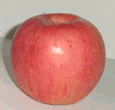Apple fruit nutrition facts
Delicious and crunchy apple fruit is one of the most popular fruits, favorite of health conscious, fitness lovers who believe in the concept “health is wealth.” This wonderful fruit is packed with rich phyto-nutrients that in the true senses indispensable for optimal health. The antioxidants in apple have much health promoting and disease prevention properties; thus truly justifying the adage, “an apple a day keeps the doctor away.”
Scientific name: Malus domestica.
Apples are obtained from the medium-sized tree belonging to the Rosaceae family. The apple tree is originated in the mineral-rich mountain ranges of Kazakhstan, and now being cultivated in many parts of the world.
Apple fruit features oval or pear shape; and the outer skin has different colors depending upon the cultivar type. Internally, the juicy pulp has been off-white to cream in color and has to mix of mild sweet and tart taste. Its seeds are inedible because of their bitter taste.
Hundreds of varieties of apples are either eaten as table fruits or as dessert fruit grown in the US and worldwide. Some of the apples are sought-after in cooking and baking too.
| Energy | 50 Kcal | 2.5% |
| Carbohydrates | 13.81 g | 11% |
| Protein | 0.26 g | 0.5% |
| Total Fat | 0.17 g | 0.5% |
| Cholesterol | 0 mg | 0% |
| Dietary Fiber | 2.40 g | 6% |
| Vitamins | ||
|---|---|---|
| Folates | 3 µg | 1% |
| Niacin | 0.091 mg | 1% |
| Pantothenic acid | 0.061 mg | 1% |
| Pyridoxine | 0.041 mg | 3% |
| Riboflavin | 0.026 mg | 2% |
| Thiamin | 0.017 mg | 1% |
| Vitamin A | 54 IU | 2% |
| Vitamin C | 4.6 mg | 8% |
| Vitamin E | 0.18 mg | 1% |
| Vitamin K | 2.2 µg | 2% |
| Electrolytes | ||
| Sodium | 1 mg | 0% |
| Potassium | 107 mg | 2% |
| Minerals | ||
| Calcium | 6 mg | 0.6% |
| Iron | 0.12 mg | 1% |
| Magnesium | 5 mg | 1% |
| Phosphorus | 11 mg | 2% |
| Zinc | 0.04 mg | 0% |
| Phyto-nutrients | ||
| Carotene-ß | 27 µg | -- |
| Crypto-xanthin-ß | 11 µg | -- |
| Lutein-zeaxanthin | 29 µg | -- |
Health benefits of apple
- Delicious and crunchy apple fruit is notable for its impressive list of phtyto-nutrients, and anti-oxidants. Studies suggest that its components are essential for normal growth, development and overall well-being.
- Apples are low in calories; 100 g of fresh fruit slices provide only 50 calories. They, however, contain no saturated fats or cholesterol. Nonetheless, the fruit is rich in dietary fiber, which helps prevent absorption of dietary-LDL or bad cholesterol in the gut. The fiber also saves the colon mucous membrane from exposure to toxic substances by binding to cancer-causing chemicals inside the colon.
- Apples are rich in antioxidant phyto-nutrients flavonoids and polyphenolics. The total measured anti-oxidant strength (ORAC value) of 100 g apple fruit is 5900 TE. Some of the important flavonoids in apples are quercetin, epicatechin, and procyanidin B2. Additionally, they are also good in tartaric acid that gives tart flavor to them. Altogether, these compounds help the body protect from deleterious effects of free radicals.
- Apple fruit contains good quantities of vitamin-C and beta-carotene. Vitamin C is a powerful natural antioxidant. Consumption of foods rich in vitamin C helps the body develop resistance against infectious agents and scavenge harmful, pro-inflammatory free radicals from the body.
- Further, apple fruit is a good source of B-complex vitamins such as riboflavin, thiamin, and pyridoxine (vitamin B-6). Together these vitamins help as co-factors for enzymes in metabolism as well as in various synthetic functions inside the body.
- Apple also contains a small amount of minerals like potassium, phosphorus, and calcium. Potassium is an important component of cell and body fluids helps controlling heart rate and blood pressure; thus, counters the bad influences of sodium.
Reference
http://www.nutrition-and-you.com/apple-fruit.html

















0 komentar:
Posting Komentar